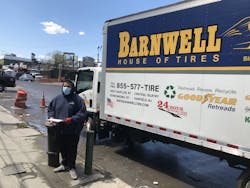Barnwell House of Tires Inc. operates throughout New York City — which has become the epicenter of the COVID-19 pandemic in the United States.
The Ronkonkoma, N.Y.-based dealership is the exclusive truck tire and retread supplier to the New York City Department of Sanitation, which is the largest municipal sanitation department in the world with more than 2,200 waste haul trucks.
Trash pick-up hasn’t stopped during the COVID-19 crisis, Scott Weeden, Barnwell’s vice president of sales, told MTD.
Typically, the sanitation department orders 800 truck tires a month from Barnwell. In early April, the organization abruptly bumped its requirement to 1,500 tires.
“When they went to that, it caught us off-guard,” says Weeden.
Barnwell worked with its supplier to locate additional units. “Once we get those first 1,500 units in there, we’ll see what they need to order moving forward,” Weeden said in early-May.
The dealership also supplies new tires and retreads to school bus fleets, some of which have been used to transport infected patients from hospitals to quarantine centers. “The bus drivers have to wear hazmat suits.”
Barnwell also counts several utility fleets among its customers. “We’re doing fleet surveys to stop problems from happening after trucks leave the yard,” says Weeden. “One company is letting its drivers take trucks home every night, so that has made it kind of tough to check those vehicles.”
The pandemic has forced some of Barnwell’s utility customers to implement new practices. “They’re keeping one driver in one vehicle to stop the spread of the virus.”
Barnwell’s employees, including roadside service truck operators and delivery drivers, have changed the way they interact with customers.
“We’ve gone paperless,” says Weeden. “We don’t require signatures for pick-ups or deliveries. On road service calls, when we come out, we follow all the social distancing requirements. There’s no physical signature” after calls are completed.
Surprisingly, Barnwell is running fewer road service calls. “It has dropped off compared to what we’re used to. But every call is vital.”
Weeden says operating during the COVID-19 pandemic has made Barnwell a more nimble and efficient organization.
“You have to focus on your process, your inventories and your cash flow,” he notes. “We’re delivering into the most densely populated area of the country, while practicing social distancing. It’s been challenging, to say the least. But we’re becoming more efficient. Customers throughout our network can order a product today and we’ll have it delivered tomorrow.
“We’re also being smarter on what we’re ordering,” he continues. “Instead of having 40 units on the shelf we might only have 20. We’re being proactive with our customers — seeing what they need. We do a lot of tracking of tires. We’re working smarter.”
Barnwell was in a “strong position” before entering the crisis, he adds, “and when we come out of this, we’ll be an even stronger company.
“But nobody could have predicted the magnitude of the impact of the virus, especially in (the New York City) area. We’re doing what we can to keep everything moving as best as possible. ?
Barnwell Wrestles With the Human Cost of COVID-19
COVID-19 has impacted Barnwell House of Tires in a personal way, says Scott Weeden, the dealership’s vice president of sales. “We had three people in our organization test positive for it and three have spouses who tested for it.”
Two of the company’s fleet customers “have had people die from it,” he told MTD in late-April. “One owner came down with it.”
The father of another fleet’s owner “was in the hospital on a ventilator. The hard thing about this is that (everyone) has been so focused on making things continue to happen that even when someone gets the virus and dies, there’s no grieving period. There are no funerals. It’s ‘we have to move on and get past it and keep the city going.’
“It’s been really, really trying,” he says. “I live in Brooklyn and the sirens haven’t stopped. It’s real.”





